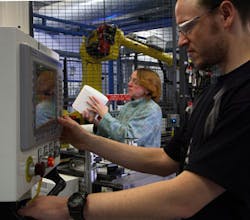Corning Inc. (IW 500/136), the $8 billion specialty glass and ceramics manufacturer, believes millennials’ interest in technology fits its sweet spot as a potential employer. Todd Stout, manager, Global Sourcing Strategies, points out that the manufacturing of glass and ceramics is highly automated, with employees commonly setting up robots and programming sophisticated production equipment.
“The environment that they are exposed to here at Corning embraces technology,” he says. Moreover, Corning makes products that are essential parts of familiar technologies, such as the Gorilla Glass found on over 2 billion devices such as smartphones and tablets. Once potential hires understand that, Stout says, it is easy to transition them to working on the advanced technologies Corning uses to make these products.
Corning offers a culture that fits with millennials’ values and interests, Stout claims. For young people who may have seen their parents or grandparents downsized, Corning offers the stability of a 162-year old company that embraces work-life balance and offers a strong benefit package. The company also provides work on innovative technology, particularly in its life sciences business, that appeals to millennials’ strong sense of social responsibility.
Do millennials actually differ from previous generations? Stout says they are eager people and values driven, but as he notes, previous generations have shared those characteristics. While they may be a little more self-confident coming into the workplace, he observes, they commonly look to a support network for career advice.
“They are not just saying, ‘Yes, I am going to make this decision on my own,’” Stout says. “They are reaching in to their support network and saying, ‘This is what I am thinking about. Help me out.’ So we need to not only attract the individual but a larger net of people to brand Corning as an employer of choice.”
Corning has spent the past two years developing a new leadership development program for MBAs that is designed to help the manufacturer, in Stout’s words, “hire tomorrow’s leaders.”
Stout says Corning is seeking MBA students from top business schools who have good foundational leadership skills, some exposure to hi-tech manufacturing and a passion for technology but likely no experience in glass or ceramics manufacturing. Candidates are typically 25 to 27 years old, with 4 to 5 years of work experience. About one-third have an engineering undergraduate degree.
“When we go to a school, an executive is assigned to that school to help us build relationships and connect with students,” Stout says, explaining that bringing a senior executive to campus conveys the message that students there are important to Corning.
Executive involvement in the recruiting of students and in the development program is an evolution of previous mentoring done by Corning executives. “They get that we need to set the company up for tomorrow and to do that, we need a pipeline of leadership talent,” Stout notes.
Once they join Corning, the company provides MBA graduates with diverse business experience in multiple areas of its business. It provides participants with executive exposure and engagement, and pairs them with a mentor/coach to help them proactively manage their careers. The company also offers participants ongoing leadership training to help them refine their skills and be ready to take on positions of increasing responsibility.
“There is going to be proactive career management so that when they come into the organization, there is going to be a collaborative effort with them, HR, their general manager, and someone in talent management who is going to help guide them through their first three-ish positions here at Corning to ensure that they continue to grow and challenge themselves,” explains Stout.
This leadership development program is also serving as the foundation for similar efforts in Asia and other parts of the world. Stout said the different regions will adapt the program to their particular needs and the company will gradually “bridge” the programs as it gains experience with the process.
About the Author
Steve Minter
Steve Minter, Executive Editor
Focus: Leadership, Global Economy, Energy
Call: 216-931-9281
Follow on Twitter: @SgMinterIW
An award-winning editor, Executive Editor Steve Minter covers leadership, global economic and trade issues and energy, tackling subject matter ranging from CEO profiles and leadership theories to economic trends and energy policy. As well, he supervises content development for editorial products including the magazine, IndustryWeek.com, research and information products, and conferences.
Before joining the IW staff, Steve was publisher and editorial director of Penton Media’s EHS Today, where he was instrumental in the development of the Champions of Safety and America’s Safest Companies recognition programs.
Steve received his B.A. in English from Oberlin College. He is married and has two adult children.


